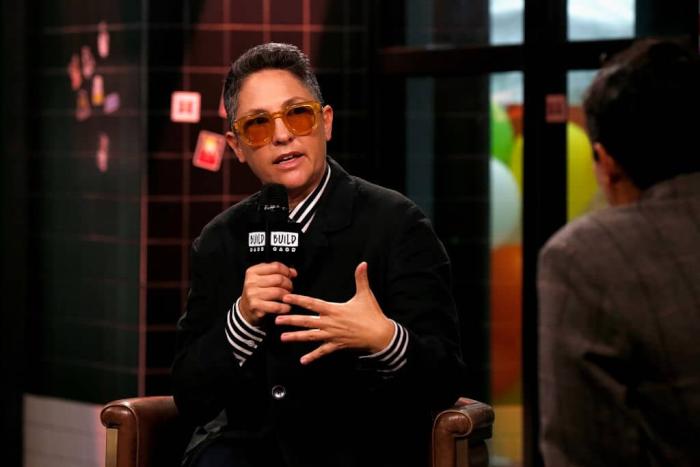

Let's Bask in the Glory of this Scathing Review of Jill Soloway's New Book
By Kayleigh Donaldson | Celebrity | November 5, 2018 |
By Kayleigh Donaldson | Celebrity | November 5, 2018 |

Writer and showrunner Jill Soloway has built a major reputation in the world of television and feminist activism since Amazon’s Transparent became a much acclaimed hit. Since then, Soloway (who identifies as non-binary but does not mind about pronouns so I will stick with ‘they/them’ just to be safe) has worked to build on that clout, creating a production company that lauds itself for its intersectional principles and working with the #TimesUp movement to improve gender equality in the industry. They have not been without their controversies, and She Wants It: Desire, Power, and Toppling the Patriarchy, their new memoir-slash-manifesto, seems to be a way of confronting that. With glowing quotes from everyone from Norman Lear to Chelsea Handler, the book comes with certain expectations. Well, let’s just say it sounds like they didn’t meet their mark.
I heartily recommend you read the entire review on Affidavit, written by Andrea Long Chu, to understand why this piece has gone viral. If you thought that Washington Post piece on Post Malone was an achingly precise dissection of awfulness, then brace yourselves. Just read the full piece then come back to us for discussion.
Have you read it?
Okay?
I know, right?!
Here are just a handful of quotes from Chu’s astounding review that had us freaking out in the Overlords Slack chat:
As a lightweight behind-the-scenes look at a critically acclaimed television series, Jill Soloway’s new memoir She Wants It: Desire, Power, and Toppling the Patriarchy is just south of worth purchasing at the airport. As a book about desire, power, or toppling the patriarchy, it is incompetent, defensive, and astonishingly clueless.
But as this book confirms, Soloway’s life has rapidly imitated her art. Like Sarah Pfefferman, she would leave her husband for a woman; like Josh Pfefferman, she would become a successful entertainment industry player, in douchebag shades and trousers with kicks; like Ali Pfefferman, she would date a celebrated lesbian poet and experiment with a nonbinary gender. Soloway now identifies as trans and answers to both she and they pronouns, telling CBS This Morning, “She is fine; when people say she and her, I don’t correct them, but when people say they and them, it’s like frosting.” Consider this review a muffin.
But self-importance alone could never guarantee writing this atrocious. Narcissism can be wildly compelling in the hands of a professional. That this is the prose of a celebrated television auteur may be explained only if one recalls that TV writing, unlike the art of memoir, is a group effort. The narrator of She Wants It is a Gen Xer in millennial drag: precious, out of touch, and exceedingly prone to bathos.
Throughout She Wants It, Soloway alternates, confusingly, between contradictory sites of gender enunciation. One moment, she will wax poetic about “not having to choose” a binary identity (“How would it be if everybody saw pure soul before gender?”); the next, she will breezily reference “our lives,” “our bodies,” “our interests” as women […] Readers would be forgiven for thinking Soloway a fair-weather woman: female when it’s culturally advantageous to be female, and not, when it’s not.
Soloway writes early on in She Wants It. “She was being her true self, a woman. Now I could be my true self, a director.” If the circumstances of her shiny new gender are, shall we say, suspect—the cisgender creator of a television show about trans issues, long criticized for presuming to speak for trans people, comes out as trans herself—all we need remember is that being trans because you want the attention doesn’t make you “not really” trans; it just makes you annoying.
I’m speechless pic.twitter.com/pq1Dh2tolM
— jourdain searles (@jourdayen) November 5, 2018
And the fatality that is the closing line:
If the question is, “Can women and queers be pretentious assholes?”, She Wants It holds the answer.
Chu’s review is best enjoyed alone, with all the other windows in your browser shut, and with your total undivided attention on the subject in hand. It’s a take-down not only of a bad book but of Soloway’s narcissistic willingness to cloak themselves in a ‘trendy’ identity at convenient moments to not only build up their own image but to deflect justified criticism from others, especially marginalized voices.
You can check out more of Chu’s work on her website and you can support her on GoFundMe.
More Like This
Halle Bailey On Why She Chose To Keep Her Pregnancy Private
Natalie Portman And Benjamin Millepied Divorce After Affair Scandal
'Rust' Trial of Hannah Gutierrez-Reed Showed an Appalling Lack of Gun Safety
Bethenny Frankel’s Advice for Staying Thin: ‘Taste Everything, Eat Nothing’
Andy Cohen Demands Retraction and Apology from Leah McSweeney for ‘Categorically False’ Allegations

What’s Old Is New Again: Old Hollywood Glamour Glitters at the 2024 Oscars
Al Pacino Presents Best Picture Oscar, Confuses Everyone
The Dangerous Lie Of 'TradWives'
A Legendary Horror Franchise Is Headed To Television
'The Mandalorian' Season 4 Is Probably Not Happening
Halle Bailey On Why She Chose To Keep Her Pregnancy Private
More Like This
Halle Bailey On Why She Chose To Keep Her Pregnancy Private
Natalie Portman And Benjamin Millepied Divorce After Affair Scandal
'Rust' Trial of Hannah Gutierrez-Reed Showed an Appalling Lack of Gun Safety
Bethenny Frankel’s Advice for Staying Thin: ‘Taste Everything, Eat Nothing’
Andy Cohen Demands Retraction and Apology from Leah McSweeney for ‘Categorically False’ Allegations
Reviews